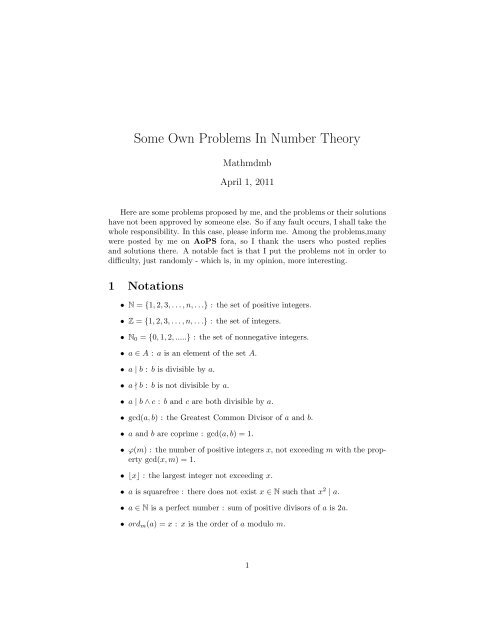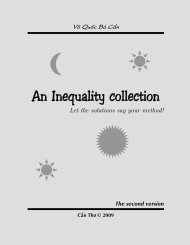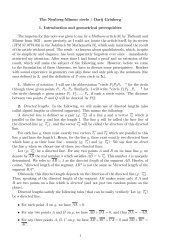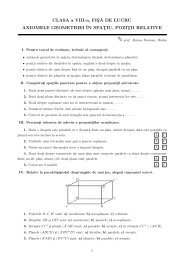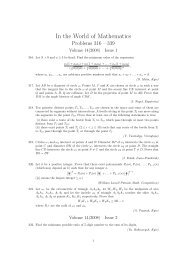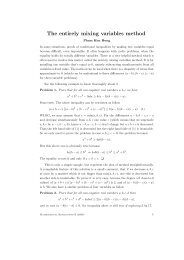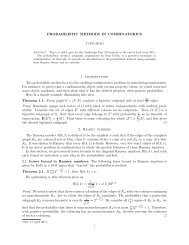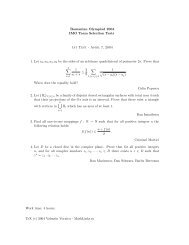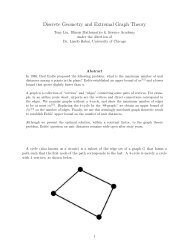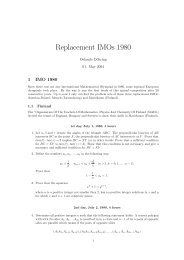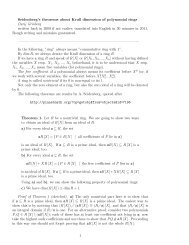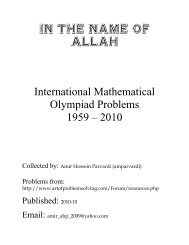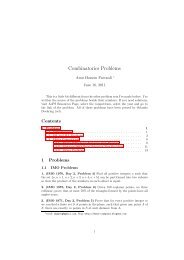Some Own Problems In Number Theory
Some Own Problems In Number Theory
Some Own Problems In Number Theory
You also want an ePaper? Increase the reach of your titles
YUMPU automatically turns print PDFs into web optimized ePapers that Google loves.
<strong>Some</strong> <strong>Own</strong> <strong>Problems</strong> <strong>In</strong> <strong>Number</strong> <strong>Theory</strong><br />
Mathmdmb<br />
April 1, 2011<br />
Here are some problems proposed by me, and the problems or their solutions<br />
have not been approved by someone else. So if any fault occurs, I shall take the<br />
whole responsibility. <strong>In</strong> this case, please inform me. Among the problems,many<br />
were posted by me on AoPS fora, so I thank the users who posted replies<br />
and solutions there. A notable fact is that I put the problems not in order to<br />
difficulty, just randomly - which is, in my opinion, more interesting.<br />
1 Notations<br />
• N = {1, 2, 3, . . . , n, . . .} : the set of positive integers.<br />
• Z = {1, 2, 3, . . . , n, . . .} : the set of integers.<br />
• N0 = {0, 1, 2, .....} : the set of nonnegative integers.<br />
• a ∈ A : a is an element of the set A.<br />
• a | b : b is divisible by a.<br />
• a ∤ b : b is not divisible by a.<br />
• a | b ∧ c : b and c are both divisible by a.<br />
• gcd(a, b) : the Greatest Common Divisor of a and b.<br />
• a and b are coprime : gcd(a, b) = 1.<br />
• ϕ(m) : the number of positive integers x, not exceeding m with the property<br />
gcd(x, m) = 1.<br />
• ⌊x⌋ : the largest integer not exceeding x.<br />
• a is squarefree : there does not exist x ∈ N such that x 2 | a.<br />
• a ∈ N is a perfect number : sum of positive divisors of a is 2a.<br />
• ordm(a) = x : x is the order of a modulo m.<br />
1
2 <strong>Problems</strong><br />
1. Prove that there does not exist a pair(n, m) ∈ N so that n+3m and n 2 +3m 2<br />
are both perfect cubes. Find all such pairs if (m, n) ∈ Z.<br />
2. Find all primes p such that the number 11 p + 10 p is a perfect power of a<br />
positive integer.<br />
3. <strong>In</strong> a single person game,Alex plays maintaining the following rules:<br />
She is asked to consider the set of all natural numbers less than n on a board.Then<br />
she starts from 1 and whenever she gets an integer co-prime to n,she writes 1 on<br />
the board,otherwise she writes 0.That is she will write a binary sequence with<br />
either 1 or 0.<br />
She denotes the number of 1 ′ s in this binary sequence of n by Φ1(n) and the<br />
number of 0 ′ s by Φ0(n).<br />
Now,she wins if she can choose an n having at least 2 prime factors in the first<br />
choice such that Φ1(n)|n.Prove the following:<br />
⋆ 1 :There exist infinitely many n such that she can win in the first move.<br />
⋆ 2 :If she chooses an n having more than 3 prime factors,she can’t never win.<br />
⋆ 3 :If n = �n i=1 pai i ,then �n i=1 pai−1 i |Φ0(n) + 1.<br />
⋆ 4 :Find all such n such that she can win.<br />
4. Prove that for all odd p � |c, ord p k(c) = ordp(c).p k−1 .<br />
5. Let Fn = 22n + 1 be the nth Fermat number. Prove that<br />
2 2m +2 n<br />
| F Fm−1<br />
n − 1, ∀m, n ∈ N.<br />
6. Let a > 2 be an integer. Show that a a−1 − 1 is never squarefree.<br />
7. Show that there are infinitely many pairs of positive integers (a, b) such that<br />
is an integer, then it is a perfect cube.<br />
if the number a5 +b 5<br />
a 3 b 3 +1<br />
8. Let p ≡ 2 (mod 3) be a prime number. Show that there exists a complete<br />
set of residue class of p such that the sum of its elements is divisible by p 2 .<br />
9. Prove that 81|10 n+1 − 10 − 9n for all n ∈ N0.<br />
10. Find all positive integers n such that n|2 n! − 1.<br />
11. Find all positive integers n such that<br />
1. n | 2 n + 1,<br />
2. n | 3 n + 1.<br />
12. Let p be a prime. Determine all perfect numbers having p factors.<br />
13. Prove that a number which has only one prime factor, can’t be a perfect<br />
number.<br />
2
14. Find all pairs (a, b) of positive integers such that ab | a 3 + b 3 .<br />
15. Solve in positive integers the equation<br />
16. Find all n ∈ N such that<br />
a 7 + b 7 = 823543 · (ac) 1995 .<br />
1. the number n 2 − 27n + 182 is a perfect square.<br />
2. the number n 2 − 27n + 183 is a perfect square<br />
17. Find all (a, b) ∈ N0 such that the number 7 a + 11 b is a perfect square.<br />
18. Consider a complete set of residues modulo p. Show that we can partition<br />
this set into two subsets with equal number of elements such that the sum of<br />
elements in each set is divisible by p.<br />
19. Let ai, m, and n be positive integers such that ai + m is a prime for all<br />
1 ≤ i ≤ n. Let N = �n i=1 pai i and let S be the number of ways of expressing N<br />
as a product of m positive integers. Prove that mn | S.<br />
20. Let n be a positive integer. Prove that there exists k ∈ N such that<br />
n<br />
⌊ m√ n + k<br />
><br />
n⌋ ⌊ m√ n + k⌋ .<br />
21. Find all integers (a, b, c, d) such that abc − d = 1 and bcd − a = 2.<br />
22. Find all positive integer values that x2 +y 2 +1<br />
xy+1<br />
integers.<br />
3<br />
can take where x and y positive
References<br />
[1] AoPS topic #393335, Lifting The Exponent Lemma (Containing PDF<br />
file), posted by Amir Hossein Parvardi (amparvardi on AoPS).<br />
http://www.artofproblemsolving.com/Forum/viewtopic.php?t=393335<br />
[2] Santiago Cuellar, Jose Alejandro Samper, A nice and tricky lemma (lifting<br />
the exponent), Mathematical Reflections 3 2007.<br />
[3] AoPS topic #356847, n+3 perfect cube (Problem 1 in this article), posted<br />
by mathmdmb.<br />
http://www.artofproblemsolving.com/Forum/viewtopic.php?t=356847<br />
[4] AoPS topic #36224, perfect power (Problem 2 in this article), posted by<br />
mathmdmb.<br />
http://www.artofproblemsolving.com/Forum/viewtopic.php?t=362224<br />
[5] AoPS topic #393335,Lifting The Exponent Lemma (Problem 5 in this<br />
article), posted by amparvardi.<br />
http://www.artofproblemsolving.com/Forum/viewtopic.php?p=2198886<br />
[6] AoPS blog #85314,The Law Of Nature-<strong>Number</strong> <strong>Theory</strong> (Problem 8 in this<br />
article), posted by mathmdmb.<br />
http://www.artofproblemsolving.com/Forum/blog.php?u=85314<br />
[7] AoPS topic #356079, Find all n (Problem 16 in this article), posted by<br />
mathmdmb.<br />
http://www.artofproblemsolving.com/Forum/viewtopic.php?t=356079<br />
[8] AoPS topic #304361, Problem 202 in <strong>Number</strong> <strong>Theory</strong> Marathon (problem<br />
17 in this article), posted by mathmdmb.<br />
http://www.artofproblemsolving.com/Forum/viewtopic.php?p=2223300<br />
4


